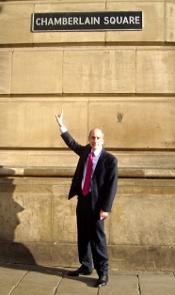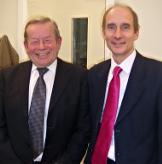Would an elected mayor change Birmingham and Coventry for the better?
On the second leg of my tour of the 12 cities holding referenda to decide whether to have an elected mayor, I travelled to Birmingham and Coventry.
On the second leg of my tour of the 12 cities holding referenda to decide whether to have an elected mayor, I travelled to Birmingham and Coventry to hear what people think about the idea.
A million people, an annual budget of £4bn – yet an unemployment rate of 10 per cent and among the highest concentrations of poverty in the country. These vital statistics about Birmingham, Britain’s second city and the largest unitary local authority in Europe, are driving the debate on whether "Birmingham should have its Boris" and vote for a directly elected mayor in the referendum now set for next May 2012. Should Birmingham have a Boris?

In Chamberlain Square, outside Birmingham Town Hall. Joseph Chamberlain, the great 19th century mayor of Birmingham, transformed the city for the better. The debate is intensifying on whether a 21st century mayor could do the same again
Arriving at Birmingham New Street station, one of the biggest eyesores in Britain, graphically illustrates the sense of malaise and failure in this city. The station is soon to be rebuilt, thanks in good measure to the efforts of the current council leader Mike Whitby, but the fact that it has taken so long, and that so much of the city’s infrastructure and social fabric remains blighted, highlights the challenge and opportunity for an elected mayor. Jerry Blackett, Chief Executive of Birmingham chamber of commerce, reels off a long list of urgent priorities for the city’s business sector not currently being delivered, starting with the city’s airport which has been due an extension for years but which is still not happening. Julia King, Vice Chancellor of Aston University, says a mayor could provide "a really significant boost to leadership and profile" for the city, which punches below its weight in so many ways. Views on the status quo are inevitably more mixed among the city’s politicians. Mike Whitby himself is sitting on the fence on whether there should be a mayor and whether he wants the job. His Lib Dem deputy leader in the city’s Tory-Lib Dem coalition, Paul Tilsley, is opposed. However, Sir Albert Bore, the city’s Labour Leader, is strongly in favour, and points to the postal referendum which took place in the city a decade ago. A majority voted for an elected mayor on a 30 per cent turnout, but the council ignored the vote. The Birmingham Mail is also strongly in favour. If my phone-in with one of the local radio stations [from 7:59] is any guide, the “voice on the street” is one of positive interest.
What powers would the mayor have?
This is a big point of discussion among political and business leaders. They are particularly concerned about education, economic regeneration and policing. The mayor would be in charge of education, as this is an existing power of Birmingham council. But economic regeneration is being vested in the new Local Economic Partnerships, which are having a painful birth, and control of policing is due to pass to directly elected police commissioners – which for Birmingham means a single police commissioner for the whole of the West Midlands. "This is a complete nonsense," said one business leader. “If the mayor is to have the necessary clout, he or she needs to have clear responsibility for regeneration and the police."
The relationship between mayors and police commissioners is turning into a sensitive issue as city leaders realise that two entirely separate directly elected officials are being proposed by the government – a potential source of unproductive tension and a missed opportunity to create an effective mayoral office including powers over policing. This will be an issue of serious debate and concern as the mayoral legislation passes through Parliament in the coming months.
Coventry asks: what would an elected mayor cost?
The mood in Coventry is less sympathetic to mayors. The city is only 20 minutes from Birmingham by train, but feels far further. Coventry’s business and political leaders point to Warwickshire, not Birmingham, as their economic hinterland, and there is less dissatisfaction with the status quo in terms of leadership and vision. In my radio phone in here, the worry was about the cost of a mayor, although I pointed out that the city’s existing chief executive and council leader cost a quarter of a million pounds between them in salary alone, far more than the pay of the Prime Minister let alone a new mayor. But in Coventry, too, the general view is that this city also punches below its weight, and needs to do far more to attract jobs, business and regeneration. "Who knows that we are England’s 9th largest city?," says Nigel Thrift, the vice chancellor of Warwick University. "This is one of Coventry’s best kept secrets." The political debate is also hotting up here. Bob Ainsworth, the former Defence Secretary and one of the city’s three MPs, has hinted that he might run for Mayor, if the office is created. One of the city’s younger Tory leaders is also eyeing it up, as are some of its prominent business leaders. "Look at Leicester, a nearby city of similar size to us," says one. "They are about to vote in an elected mayor, and it could be one of the city’s prominent MPs, Sir Peter Soulsby. Do we want to be left behind?" Interesting to note that even at this early stage, national politicians like Bob Ainsworth and Peter Soulsby are toying with leaving Westminster to seek to run their home cities as Mayor. The same happened in London, with Ken and Boris both attracted from the House of Commons to what they saw as the greater challenge of leading the capital. A redistribution of political talent from Westminster to leadership of the major cities could only be a good thing.
- Topic
- Devolution
- Keywords
- Local government
- Publisher
- Institute for Government
